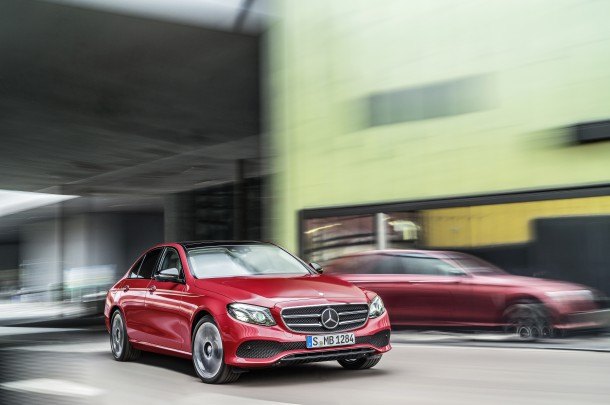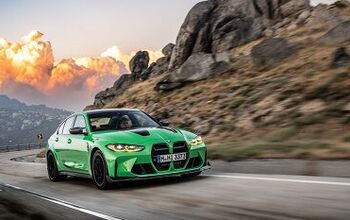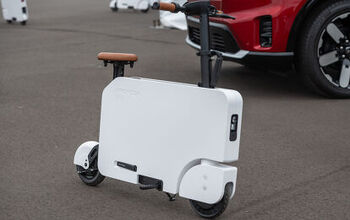Nein! Mercedes-Benz Won't Let the Diesel Dream Die

The world’s oldest automaker isn’t about to let regulators pry its diesel engines from its warm, German hands.
Mercedes-Benz is rolling out a new line of oil-burning engines that will surpass even the most stringent emissions requirements, AutoExpress reports.
So stingy are the new diesels, the automaker says they’ll pass looming European Union requirements that aren’t scheduled to go into effect until 2017.
European regulators have turned up the heat on automakers ever since Volkswagen’s emissions scandal hit the news cycle last fall. The decade-long diesel renaissance is in danger of becoming a memory on the continent, but Mercedes-Benz is fighting back with technology.
The secret to turning the scandal-plagued fuel into a viable propulsion source lies in a newly compact (and thus more efficient) exhaust gas recirculation system, which lowers nitrous oxide (NOx) emissions beyond the level of previous engines.
Mercedes now integrates the feature into the engine block, making for a compact unit that can fit in a wider range of vehicles. It’s also less affected by outside temperature.
The first offering from the new diesel family is a 2.0-liter four-cylinder unit bound for the E-Class. That mill makes 195 horsepower and 295 pounds-fee of torque (European specs), and will replace the 2.1-liter found in the U.S.-market E250 BlueTEC sedan and GLE300d SUV.
Mercedes-Benz said the aluminum-block engine is capable of achieving 72.4 miles per gallon in the E-Class. Current emissions regulations in Europe call for no more than 80 milligrams of NOx per kilometer, but the automaker says the new engine is capable of emitting just 13 mg.
The full diesel lineup should be in place by 2019.
[Image: Mercedes-Benz USA]

More by Steph Willems


































Comments
Join the conversation
@Big Al from Oz, Very interesting times.
Automakers that spend a truckload of R&D to make Diesel comply with the new Euro regulations will be remembered in the same way as those companies that invested in the very finest dial-up internet technology (ISDN 128K in case you are wondering). Once the Tesla Model 3 and the Chevrolet Bolt start retailing for the price of a loaded Camry or a well-spec'ed BMW 3-series, nobody is going to pay the same amount money to drive a Diesel with 10+ second 0-60 times and pay extra for fuel for the privilege. Just like nobody wanted a slow dial-up connection and pay extra per minute for the privilege. "Electrics will never catch on" the pundits say, despite the fact the technological problems (range and quick charging) have already been solved and the infrastructure is being built as we speak. Diesel is a technological dead-end, just like ISDN, an option that will be pushed further and further in the low-end and to people doing only occasional use of the product. Why spend boatloads of R&D for such a market? On the other hand, BMW and GM have gotten the message, and are just making minor improvements to their existing Diesels, while preparing for the new technology (electrics) as best as they can. BUT, just like telephone companies went with ISDN to protect their "charge per-minute" revenue source, Mercedes goes with Diesel to protect their parts division. Good luck with that, Merc!
I really don't look forward to too many diesels on the road. Most diesels are not kept up and with the rolling coal nimnods on the road it makes me less inclined to want to see more diesels on the road. After you have been rolled a few times it makes you dislike diesels. I realize these coal rollers are not the majority but they do not help the diesel cause. A hybrid version of vehicles would meet most drivers needs. Eventually we will get off of petroleum powered vehicles but that is several generations away and any alternatives will have to be more affordable and more practical.
Dear Editor, For all the coverage of VW diesels, why are you not covering the story that Fiat diesels cheat in much the same way? The test lasts 20 minutes. The Fiat emissions controls shut off after 22 minutes. Here's the story: http://gas2.org/2016/04/25/fiat-joins-the-diesel-emissions-cheating-club/ Fiat Chrysler has several fuel economy strategies worldwide: cheating diesels, clutch-frying DSGs, brain-dead 9-speed automatics, torqueless 1.4 liter turbos, seats so uncomfortable that people avoid driving at all. The only one that actually works worth a damn is the electric car: Fiat's 500e by Bosch, built only because California said THOU SHALT...and Sergio nearly torpedoed that too, by half-assing the software, nixing DC fast charge, and telling people not to buy the car.